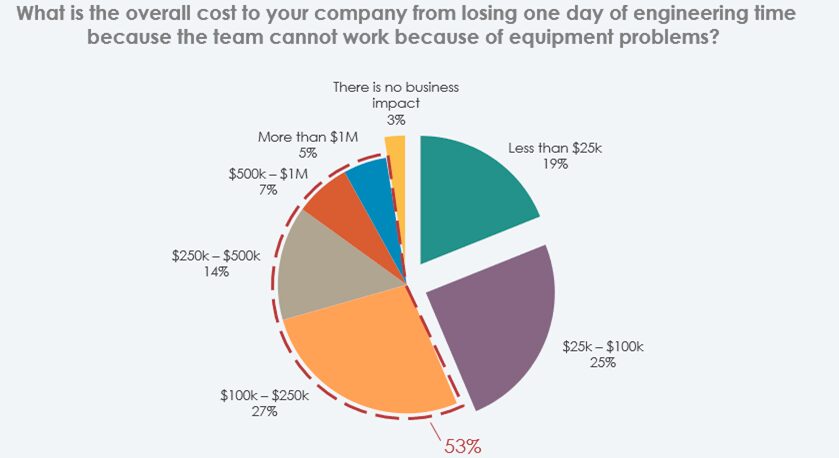Nearly every company that designs and develops electronic products experiences problems related to test equipment, and more than 90% of them say that those problems cost them revenue, according to a new survey. More than half of the survey respondents said that it costs them $100,000 or more in waste per day as they try to resolve the issues that stymie the progress of R&D teams.
The survey of more than 300 test engineers across multiple industries, including tech and telecom, was conducted by Dimensional Research and commissioned by test company Keysight Technologies. Keysight said that survey aimed to reveal “true cost” of time delays caused by misconfiguration, maintenance or training issues related to test equipment. Keysight also concluded that vastly increased test complexity has affected engineers’ ability to intimately understand the test process and troubleshoot rapidly, and they need better customer support.
“In the past, engineers would develop a deep familiarity with test equipment design and test standards. Today, they don’t have time to research how their equipment works, how to configure tests, or how to troubleshoot a complex setup to achieve the results specified in standards,” according to the report. Keysight added that engineers used to “routinely download technical manuals and service guides to learn the inner workings of a product. They had an intimate understanding of test equipment operations, test configuration, and test use cases. Today, test matrices have spiraled to upward of 20,000 test cases. It is no longer feasible to master all those cases while meeting customer expectations and time-to-market goals. Test engineers rely on automation and sophisticated software to achieve speed. But if a test case fails, troubleshooting can be difficult and time-consuming.”
Test equipment issues can quickly lead to impacts business operations and/or revenue, the survey found. Nearly half of the survey respondents said that their business is negatively impacted within the first day of test equipment malfunction, and more than 90% reported that they had experienced issues of calibration, technical problem resolution or equipment performance that rose to the level of business impacts.
Keysight’s survey found that 97% of participants reported project delays due to test equipment issues. The most common issues were equipment failure that required repairs (reported by 63% of respondents), equipment misconfigurations (56%) and equipment being out of calibration (50%).

“Manufacturing test and R&D engineers are truly on the front line of this battle. In the past, they had the time to become experts on test equipment and standards,” said Ted Burns, global director of KeysightCare at Keysight, the company’s customer support program that aims to . “However, with test matrices spiraling, and use cases vastly increasing, they simply don’t have time to research test equipment functionality, how to optimize test configurations, or how to troubleshoot complex tests in complicated test environments. The result is a reactive, firefighting approach, which causes expensive delays, loss of revenues and engineering teams resorting to late nights and undesired weekend work as their only schedule mitigation.”
Keysight said that according to its survey, 95% of test engineers said they need help every month, and early 60% said they experience half a dozen test equipment-related issues per month.”What is even more apparent is that the support status quo has changed. Nearly half the professionals surveyed said existing support models do not meet their expectations and business needs. They said their support models need to be faster, and support experts must be more knowledgeable,” the test company added.

